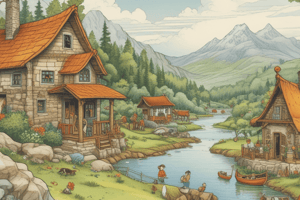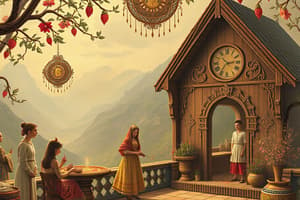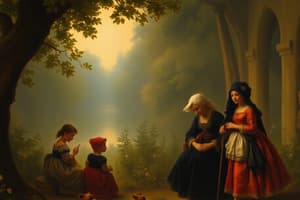Podcast
Questions and Answers
Folk culture often adapts quickly to new environments and rapidly changes over time.
Folk culture often adapts quickly to new environments and rapidly changes over time.
False (B)
The term 'folk' historically referred to a group of people and has connections to an army or clan.
The term 'folk' historically referred to a group of people and has connections to an army or clan.
True (A)
Folk cultures primarily spread through mass media and global commerce.
Folk cultures primarily spread through mass media and global commerce.
False (B)
Food grown or gathered in folk cultures tends to be diverse, reflecting a preference for variety.
Food grown or gathered in folk cultures tends to be diverse, reflecting a preference for variety.
Folk customs primarily arise from modern technological advancements and are typically featured in contemporary settings.
Folk customs primarily arise from modern technological advancements and are typically featured in contemporary settings.
The Slow-food movement stems from a desire to reject elements of folk culture.
The Slow-food movement stems from a desire to reject elements of folk culture.
Ferdinand Tönnies introduced the concepts of Gemeinschaft and Gesellschaft to describe relationships within folk and popular cultures.
Ferdinand Tönnies introduced the concepts of Gemeinschaft and Gesellschaft to describe relationships within folk and popular cultures.
The internet has played no significant role in the diffusion of popular culture.
The internet has played no significant role in the diffusion of popular culture.
The concept of popular culture heavily relies on marketing strategies to sustain its relevance.
The concept of popular culture heavily relies on marketing strategies to sustain its relevance.
Public schooling can serve as a vehicle to promote the values of a national culture.
Public schooling can serve as a vehicle to promote the values of a national culture.
Flashcards are hidden until you start studying
Study Notes
Folk Culture
- Folk culture evokes traditional customs, dances, and music, often associated with the past and festivals.
- Origin of the term "folk" traces back to Old Norse, English, and Germanic roots, referring originally to armies, clans, or groups.
- Identifies distinct cultural practices shared among homogeneous groups, often tied to geographic landscapes.
- Folk customs remain stable over time but exhibit variability across different regions; they change slowly.
- Movement of folk culture occurs through relocation diffusion as groups migrate, bringing cultural items and ideas with them.
- Knowledge transmission happens through direct interaction or participation until mastery is achieved, such as cooking or building.
- Functional adaptations to local resources result in similar architectural styles and agricultural practices within culture areas.
- Folktales and folklore serve as foundational myths and cautionary narratives.
- Holidays like Mardi Gras disrupt daily life, providing cultural relief and opportunities to challenge societal norms.
- Folk cultures historically utilized psychoactive substances for rituals which have largely been commercialized in modern times.
- Revival of folk appreciation through cultural tourism and movements like Slow Food aims to reconnect with traditional practices.
- Famous efforts to record folk traditions include John Lomax's documentation of folk songs and narratives in early 20th-century America.
- The craftsmanship of folk production differs from factory work, emphasizing knowledge and relationship to materials versus industrial disconnection.
Changing Cultural Landscape
- Decline of folk culture confronts popular culture due to nationalistic state policies affecting minority lifestyles.
- Economic changes, such as rural community shrinkage since the Industrial Revolution, hinder the reproduction of folk customs.
- Infrastructure developments (roads, internet) facilitate the diffusion of popular culture while obstructing local practices.
- Cultural interchange in places like the U.S. results in transformation as immigrants bring popular cultural influences, complicating traditional folk identities.
Popular Culture
- Defined by commerce, popular culture revolves around marketing and consumption patterns.
- Individuals engage with ubiquitous products from global supply chains, leading to homogenized lifestyles disconnected from local resources.
- Constant evolution in popular culture emerges through fashion shifts driven by the need for companies to sell new items.
- Commercialization of holidays reflects a growing trend where cultural celebrations become opportunities for consumerism.
- Technologies like the internet significantly accelerate the diffusion of popular culture, resulting in cultural lag where innovations take varying times to reach different locales.
- Popular culture is stable across geographic spaces but exhibits rapid changes over time.
Global Culture
- Globalization integrates the world into a single economic framework, leading to emerging global cultural expressions.
- Differences in product authenticity are prominent; many international fast-food chains transform local cuisines into commodities.
- Cultural attributes are commodified for mass markets, often diverging from their original forms.
- Transnational corporations dominate popular culture production, with a few major entities controlling substantial shares of the market.
Resistance to Popular Culture
- Pushback against the corporatization and homogenization of cultural practices emerges from both leftist and rightist views on globalization.
- Opposition often centers on retaining state sovereignty against perceived cultural erasures of local identities.
- Resistance includes movements advocating for local food sourcing, traditional practices, and fair-trade products, such as the Slow Food movement.
Summary
- Culture encompasses a wide spectrum of human behaviors, historically revolving around small groups practicing folk traditions.
- Transition from folk culture to popular culture marks profound societal changes, facilitated by technological advances and globalization, culminating in the emergence of a global culture characterized by shared practices.
Studying That Suits You
Use AI to generate personalized quizzes and flashcards to suit your learning preferences.




